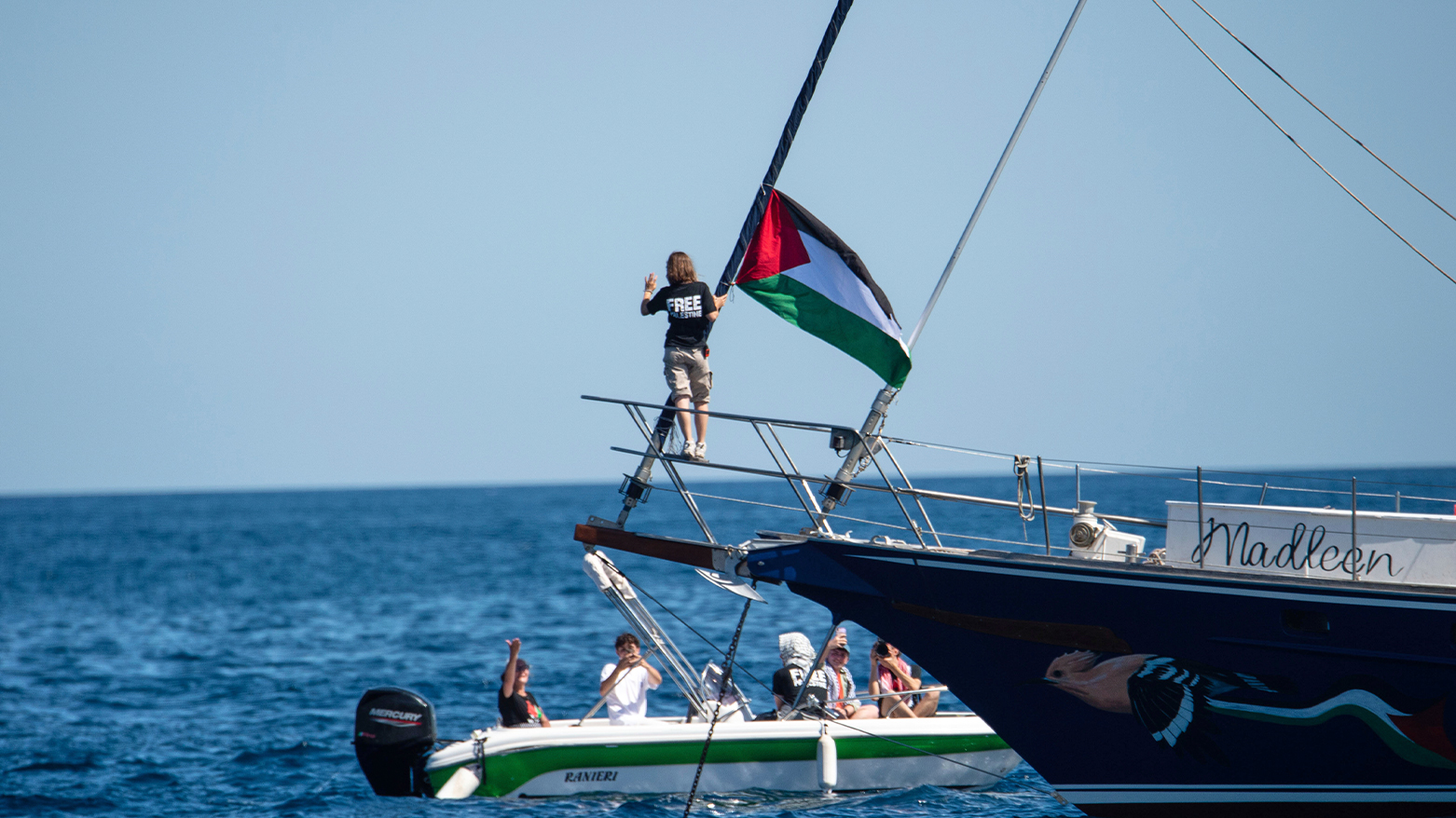Israel Seizes Activist Ship, Calls Mission ‘Propaganda’
Israeli forces intercepted the Gaza-bound aid ship Madleen, carrying activists including Greta Thunberg and EU lawmaker Rima Hassan. The Freedom Flotilla vessel was seized in international waters, sparking global concern over Israel’s blockade and treatment of humanitarian missions.

By Kamaran Aziz
ERBIL (Kurdistan24) – Israeli naval forces intercepted the "Madleen" aid ship early Monday morning as it attempted to reach Gaza with humanitarian supplies and international activists aboard, including Swedish climate campaigner Greta Thunberg and Rima Hassan, a member of the European Parliament. The vessel, part of the Freedom Flotilla Coalition's efforts to challenge Israel's naval blockade of Gaza, had set sail from Sicily on June 1 carrying a multinational crew and a limited cargo of humanitarian aid.
According to organizers, contact with the vessel was lost after alarms were triggered and passengers put on life jackets in anticipation of a potential military raid. Surveillance footage shared by the coalition showed bright lights approaching the Madleen in the early hours, followed by unidentified individuals boarding the ship. "The Israeli army boarded the vessel and has effectively kidnapped the crew," the coalition stated on Telegram. Pre-recorded videos released after contact was lost featured Thunberg saying, "If you’re seeing this video, we have been intercepted and kidnapped in international waters."
The Freedom Flotilla Coalition, a grassroots movement advocating for Palestinian rights through nonviolent action, said the Madleen was carrying symbolic humanitarian items such as baby formula, crutches, children's prosthetics, flour, rice, and medical supplies. While the cargo was minimal—less than a single truckload, according to Israeli officials—organizers emphasized the mission's moral and political significance, describing it as a refusal to accept the ongoing blockade and humanitarian crisis in Gaza.
Israel's Foreign Ministry confirmed that the ship was intercepted and redirected to Israeli shores. It shared videos of the activists being offered water and food, and stated that all passengers would be deported. The Ministry dismissed the voyage as a publicity stunt and accused participants of supporting Hamas, the group governing Gaza. Defense Minister Israel Katz took a harder line, referring to Thunberg as an "antisemite" and accusing the activists of acting as "propagandists for Hamas."
In statements to The New York Times and The Washington Post, Israeli authorities defended their actions, claiming the naval blockade was a necessary security measure to prevent weapons smuggling. The blockade has been in effect since 2007, following Hamas's takeover of Gaza. However, humanitarian organizations argue it has inflicted disproportionate suffering on Gaza's 2.2 million residents, especially amid the ongoing conflict that erupted after Hamas's deadly October 2023 attacks.
The ship's passengers included individuals from France, Sweden, Germany, Brazil, Turkey, the Netherlands, and Spain. Notable participants included Rima Hassan, a French MEP, Al Jazeera presenter Omar Faiad, journalist Yanis Mhamdi, and coalition organizers Yasemin Acar and Thiago Ávila. The group maintained regular social media updates during the voyage, which were cut off abruptly as Israeli drones and naval vessels approached the ship.
According to The Washington Post, passengers reported being surrounded by quadcopters and sprayed with an unknown white substance before their communications were jammed. Despite these actions, Israeli officials claimed the passengers were treated humanely and were "safe and unharmed."
The voyage also involved an unexpected rescue mission. Halfway through the journey, the Madleen responded to a Mayday call and rescued four Sudanese migrants attempting to escape Libyan authorities in an overcrowded dinghy. The migrants joined the activists on board, and the coalition called on European authorities to assist in securing asylum for them.
The Freedom Flotilla Coalition has a history of similar missions, most notably the 2010 Mavi Marmara incident, where Israeli commandos killed nine activists during a raid on a Turkish aid ship. The event sparked international condemnation and strained Israeli-Turkish relations. A subsequent UN inquiry labeled the Israeli raid as "excessive and unreasonable," while also acknowledging the flotilla's right to political expression.
This latest incident reignites global debates around humanitarian access to Gaza and the legality of the naval blockade. While Israel insists on its right to self-defense, critics argue that the blockade constitutes collective punishment and worsens an already dire humanitarian situation. International aid agencies continue to report severe shortages of food, medicine, and essential supplies, with many accusing Israel of weaponizing humanitarian access.
In recent months, Israel has backed a new aid delivery system managed by American security contractors under the Gaza Humanitarian Foundation. The initiative has been criticized by the UN and other NGOs for bypassing traditional humanitarian frameworks and operating under heavy military oversight. Reports of violence at aid distribution points, including shootings by Israeli forces, have further fueled concerns.
As of Monday, the Madleen remained in Israeli custody, and the fate of its crew and passengers was uncertain. While Israeli authorities insist they will be deported, activists and rights groups have called for their immediate release and the safe transfer of the aid cargo to Gaza through independent humanitarian channels.
The interception of the Madleen underscores the ongoing international scrutiny of Israel's conduct in Gaza and raises urgent questions about the rights of civil society actors engaging in nonviolent protest. As tensions remain high, the global community continues to watch closely, weighing principles of sovereignty, security, and humanitarian obligation in one of the world's most enduring conflicts.